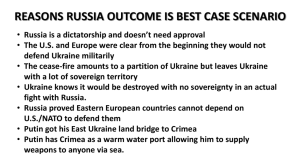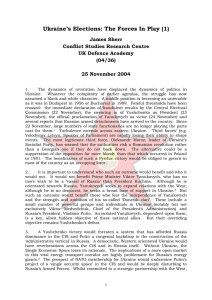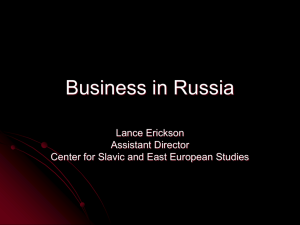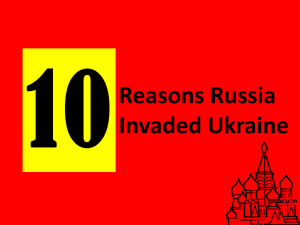Conflict Studies Research Centre Central &
advertisement
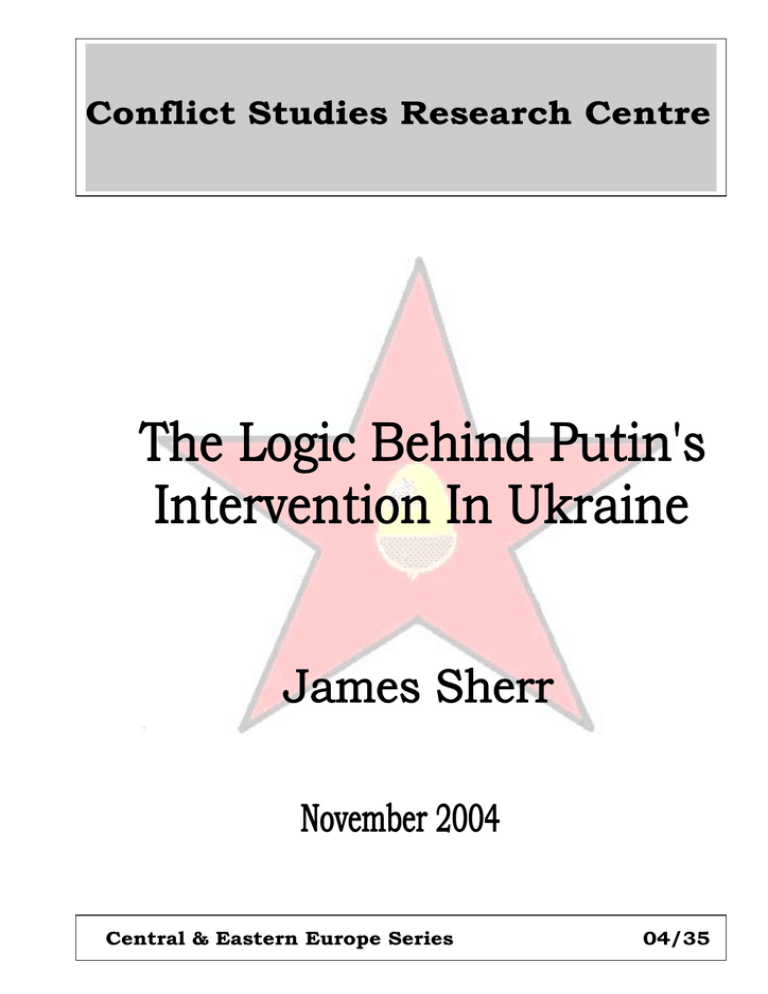
Conflict Studies Research Centre Central & Eastern Europe Series 04/35 04/35 The Logic Behind Putin's Intervention In Ukraine James Sherr Most Russian 'insiders' understand two things about Ukraine's presidential candidates. First, despite campaign rhetoric reminiscent of Kuchma's in 1994, Viktor Yanukovych has no more desire to become a 'vassal of Russia' than Leonid Kuchma did ten years ago. Neither does the so-called Donetsk clan, which has emerged as a tough and often brutal foil to other economic interests in Ukraine, including Russian interests. Second, as Prime Minister, Viktor Yushchenko presided over a significant expansion of trade with Russia and the halting of theft from its gas pipelines. He also viewed agreements as settlements, rather than raw material for the next struggle – a rare exception in 'former Soviet space'. President Putin is the ultimate insider, and he surely knows these things. Then why is he expending economic, political and personal capital to ensure Yushchenko's defeat? The answer is that Yanukovych would preserve a system that has afforded Russia dominance in the CIS and afforded Putin a congenial backdrop to the construction of the 'administrative vertical' in Russia. This is still a 'post-Soviet' system: postCold War but pre-twenty-first century and, for both good reasons and bad, out of tune with the post-modernist standards and ethos of the enlarged European Union. Yushchenko seeks to demolish this post-Soviet system and embrace this EU ethos. Moreover, despite the fecklessness of Western policy towards Ukraine in recent years, it is also possible that the EU (and NATO) will embrace him. What reinforces this answer is the fact that, for Russia, Ukraine is not (in Trotsky's celebrated phrase) 'a country like any other'. Its formal independence, its nezavisimost', has been eminently acceptable to Russia's largely pragmatic elites. But its samostoyatel'nost' – its ability to diverge from the Russian path of development – has always been a far more controversial matter, both as a point of principle and as a basis for practical discussion. A Yushchenko victory would make it a basis of practical discussion. It would also call into question the general scheme of policy put into place by Vladimir Putin since he became Acting President in December 1999. From the start, the essence of Putin's celebrated 'pragmatism' has been a disciplined effort to bring the ambitions and resources of Russia into balance. Towards NATO, the EU and the United States, this has meant accepting the limits of Russian power. Towards Ukraine and other CIS countries, it has meant the, methodical employment of Russian power and, in particular, the employment of economic power – to achieve geopolitical ends, both inside the CIS and beyond it. The strength of the project lay in the fact that the harder elements of economic power were complemented by softer elements: a similar political culture with 'parties of power' in the CIS, a similar working culture across much of the state bureaucracy and security sector and, not least important, a business culture largely unreconciled to EU norms of transparency, competition and contract enforcement. For 13 years, post-Soviet norms and the power structures sustaining them rendered 1 The Logic Behind Putin's Intervention In Ukraine Conflict Studies Research Centre ISBN 1-904423-96-5 November 2004 04/35 James Sherr Ukraine's 'European choice' devoid of substance. Indeed, it was Yushchenko's attempt to introduce EU norms in the energy sector that got him sacked as Prime Minister. But as President? Even his partial success would raise two important issues and two overarching ones. The first important issue would be Russia's future as an energy superpower. Russia is almost certain to remain an energy superpower even in the event that Ukraine becomes a full member of the Euro-Atlantic community. But on what terms? Today, a large proportion of CIS energy resources are in Central Asia, and a large part of its European transport infrastructure is in Ukraine. Not surprisingly, Central Asian suppliers are interested to discover what will happen in Ukraine. What will happen with Odessa-Brody once the current contract with TNK-BP expires in three years time? How will the evolution of TNK-BP affect Ukraine's energy sector and Russia's? Today, most Ukrainians simplistically view TNK-BP as an injection of British capital into a Russian company, whilst ignoring the fact that it also represents the injection of British business methods into a Russian company. Will this process not be conducive to Yushchenko's broader efforts to reform the Ukrainian energy market? If so, what lessons will be drawn by players in the Russian energy market? If they draw no lessons, will this maintain their established dominance or will it encourage suppliers and customers in Central Asia, the Caucasus and Ukraine to look elsewhere? The second important issue would be Russia's geostrategic position in Europe. President Putin understands that NATO is not a military threat to Russia. But by and large, Russia's armed forces do not understand this. Even if there were no war in Chechnya, the views of this pre-eminent power structure would matter. If Ukraine joins NATO, they will matter more than they do today, and President Putin knows it. He also knows that in resource terms alone, the implications of pandering to their views will be very damaging to Russia. The first overarching issue would be Russia's future role in Eurasia. The culmination of Putin's CIS policy has been the Single Economic Space (YEEP), which was established not in order to complement the EU, but 'mirror' it on the basis of its own distinctive mechanisms, laws and standards. As a result, the EU has begun to realise that there is more than one integration process unfolding in Eurasia. But without Ukraine, could the YEEP survive, and why on earth should it? Would Russia's energies not be better focused on its biggest trading partner, the EU – and, instead of 'mirroring' it, would it not be better to complement it? Would Russia's role in Eurasia not also be challenged from a different quarter? Within the past several weeks, many citizens in CIS countries have seen glimpses of a vigorous election process – and with it, images of a competent and self assured opposition, an increasingly resilient and determined civil society, presidential debates and even judges, electoral officials and police prepared to defy authority and uphold the law. What resonance will this have in Moldova, Belarus', Armenia and Kazakhstan? None at all? Would the emergence of a fully fledged democracy in the CIS become a democratic model in the CIS? What is the future for a region in which Russia is no longer a model, but merely a power? And to raise the second overarching issue, what would be the future of Russia? Can the 'administrative vertical' survive as the exception rather than the rule? If Russia 'cannot live according to the schema of Western values', then why has Ukraine embraced them? On the morrow of Yushchenko's victory, it would be 2 04/35 The Logic Behind Putin's Intervention In Ukraine surprising if many raised these questions. But if Yushchenko began to succeed, it would be surprising if many did not. The Lesser & The Greater Realism Throughout his tenure as President, Vladimir Putin has accommodated to the strengths of others and played to the strengths of Russia. On this basis, he established a strategic partnership with the United States and a business led scheme of integration in the CIS. This emphasis on economics has set him apart from Russia's traditionalists and endeared him to Western economic 'liberals'. But as much as any traditionalists, Putin has a remorselessly geopolitical view of the world and equates security will well defined 'zones of interest'. It is a focus that overlooks the real threats to security in the former USSR: the gulf between state and society, the arrogance of public authorities, the infirmity of public institutions, the criminalisation of the state and the powerlessness and anger of ordinary people. Given this focus, it is not surprising that many Ukrainians have perceived (pace Oleksandr Sushko) a linkage between Ukraine's dependency on Russia, its isolation from Europe and the 'dominance of authoritarian tendencies in the system of political power'. The fruits of this policy have been bitter-sweet: influence without security, 'neighbourliness' without affection. Where Ukraine is concerned, this is a most unnatural state of affairs. The majority of Ukrainians are incapable of anti-Russian sentiment. Yet a majority have been wary of the Russian state and apprehensive about its policy, and these perceptions have deepened – even in the wake of Putin's October visit, which was judged (even by Yanukovych supporters) as unwelcome interference in Ukraine's internal affairs. Ukrainians do not have a kto-kogo, 'zero sum' view of partnership, and they are aware that they cannot afford to have one. Whether Russia can profit from this morsel of Ukrainian wisdom remains to be seen. This article was first published in Nezavisimaya Gazeta on 19 November 2004. Want to Know More …? See: James Sherr, "Ukraine's Elections: Themes & Variations", Conflict Studies Research Centre, 04/32, 25 October 2004, http://www.da.mod.uk/csrc Disclaimer The views expressed are those of the Author and not necessarily those of the UK Ministry of Defence ISBN 1-904423-96-5 Published By: Defence Academy of the United Kingdom Conflict Studies Research Centre Haig Road Camberley Surrey GU15 4PQ England Telephone: (44) 1276 412995 Fax: (44) 1276 686880 Email: csrc@da.mod.uk http://www.da.mod.uk/csrc ISBN 1-904423-96-5

